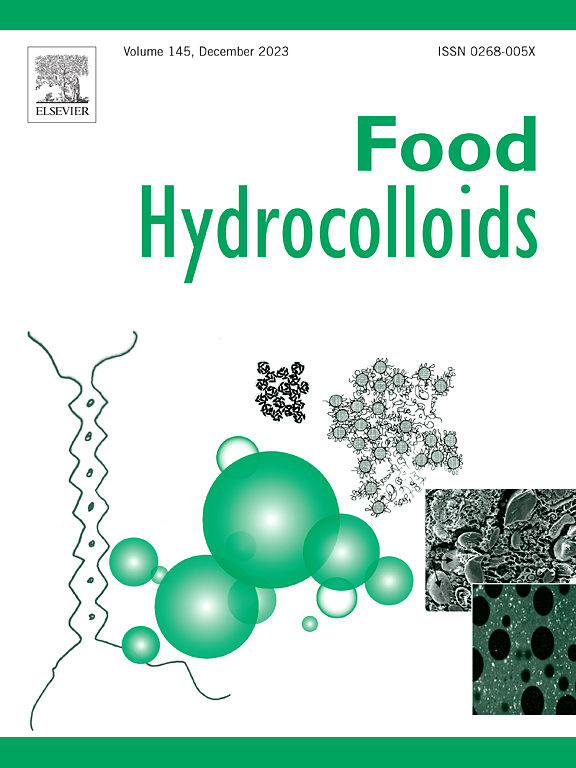高蛋白豌豆凝胶的配方:来自果胶的油和微凝胶颗粒调节流变学,摩擦学和光学性能
IF 11
1区 农林科学
Q1 CHEMISTRY, APPLIED
引用次数: 0
摘要
由于各种因素的影响,豌豆蛋白在食品工业中的作用越来越重要。大多数纯素乳制品替代品缺乏与传统乳制品相同的质地。这个问题在纯素酸奶替代品和高蛋白替代品的背景下尤为明显。因此,能够改变素食替代品的质地是至关重要的,例如含有高蛋白含量的豌豆酸奶替代品。本研究考察了通过使用菜籽油和果胶基微凝胶颗粒(MGP)来调节发酵豌豆蛋白凝胶的质地的潜力。为了实现这一目标,生产了具有高蛋白质浓度(φPPI = 12 wt%)的纯素酸奶替代品,并对其摩擦学和流变学特性进行了表征。结果表明,添加不同浓度的菜籽油可以改善其润滑性和颜色,但会增加其动态粘度和凝胶强度。添加1 μm的果胶基微凝胶颗粒作为非活性填料,可以降低动态粘度,但不会对润滑产生负面影响。这两者的结合在豌豆蛋白酸奶替代品中增强了润滑,同时降低了动态粘度和凝胶强度。这些发现提出了通过添加菜籽油和果胶微凝胶颗粒来调节素食高蛋白酸奶替代品的潜在策略。本文章由计算机程序翻译,如有差异,请以英文原文为准。
Formulation of high protein pea gels: Oil and microgel particles from pectin modulate the rheological, tribological and optical properties
Pea protein is becoming increasingly important in the food industry due to various factors. The majority of vegan alternatives to dairy products lack the same texture as their conventional counterparts. This issue is particularly evident in the context of vegan yogurt alternatives and high protein alternatives. It is therefore crucial to be able to modify the texture of vegan alternatives, such as pea-based yogurt alternatives with a high protein content.
This study examined the potential for modulating the texture of fermented pea protein gels through the use of canola oil and pectin-based microgel particles (MGP). To achieve this objective, vegan yogurt alternatives with a high protein concentration (φPPI = 12 wt%) were produced and their tribological and rheological properties were characterized.
The results showed that adding various concentrations of canola oil improved lubrication and color, but increased dynamic viscosity as well as gel strength. The addition of 1 μm pectin-based microgel particles, which act as inactive fillers, reduced dynamic viscosity without negatively affecting lubrication.
The combination of these two results in enhanced lubrication in pea protein yogurt alternatives, while simultaneously reducing the dynamic viscosity and gel strength. These findings suggest potential strategies for modulating vegan high protein yogurt alternatives through the addition of canola oil and pectin-based microgel particles.
求助全文
通过发布文献求助,成功后即可免费获取论文全文。
去求助
来源期刊

Food Hydrocolloids
工程技术-食品科技
CiteScore
19.90
自引率
14.00%
发文量
871
审稿时长
37 days
期刊介绍:
Food Hydrocolloids publishes original and innovative research focused on the characterization, functional properties, and applications of hydrocolloid materials used in food products. These hydrocolloids, defined as polysaccharides and proteins of commercial importance, are added to control aspects such as texture, stability, rheology, and sensory properties. The research's primary emphasis should be on the hydrocolloids themselves, with thorough descriptions of their source, nature, and physicochemical characteristics. Manuscripts are expected to clearly outline specific aims and objectives, include a fundamental discussion of research findings at the molecular level, and address the significance of the results. Studies on hydrocolloids in complex formulations should concentrate on their overall properties and mechanisms of action, while simple formulation development studies may not be considered for publication.
The main areas of interest are:
-Chemical and physicochemical characterisation
Thermal properties including glass transitions and conformational changes-
Rheological properties including viscosity, viscoelastic properties and gelation behaviour-
The influence on organoleptic properties-
Interfacial properties including stabilisation of dispersions, emulsions and foams-
Film forming properties with application to edible films and active packaging-
Encapsulation and controlled release of active compounds-
The influence on health including their role as dietary fibre-
Manipulation of hydrocolloid structure and functionality through chemical, biochemical and physical processes-
New hydrocolloids and hydrocolloid sources of commercial potential.
The Journal also publishes Review articles that provide an overview of the latest developments in topics of specific interest to researchers in this field of activity.
 求助内容:
求助内容: 应助结果提醒方式:
应助结果提醒方式:


